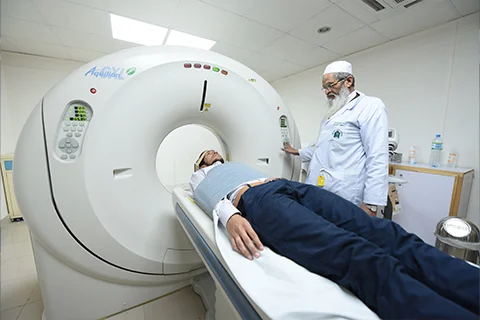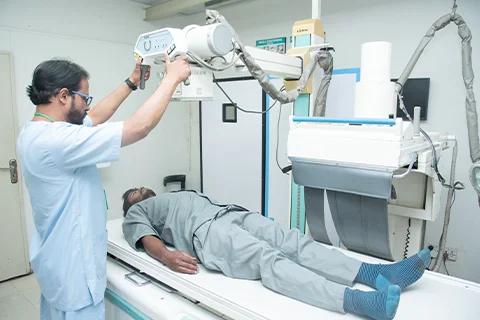Radiology is one of the most crucial departments in any hospital. It plays a central role in the early detection, accurate diagnosis, and monitoring of diseases using imaging technologies. At Hameed Latif Hospital, our Department of Radiology is equipped with the latest tools and expert staff to ensure that patients receive precise and timely diagnoses.
Radiology
14- Abu Baker Block, New Garden Town, Lahore
Visit us at our physical location for medical care
For more information call+92 (42) 111-000-043
Don’t hesitate to contact us for assistance with anything
- CONTACT US
Department of Radiology
During the COVID-19 pandemic, the department’s efficiency in chest radiology proved to be life-saving, especially for critically ill patients. Today, the Department of Diagnostic Radiology at HLH is a leader in providing advanced radiology solutions through cutting-edge technology and some of the Best Radiologists In Lahore.
Radiological services
The Department of Radiology at Hameed Latif Hospital offers a wide range of services designed for both inpatient and outpatient care. Our key services include:
o Computed tomography (CT), also known as a computerized axial tomography (CAT) scan: We have state of the art 128 slices aquilion CT machine. Whole body scans including CT cardiac angiography and CT guided biopsies are being performed routinely.
o Ultrasound: We perform a high volume of ultrasound radiology exams, especially in gynecology and obstetrics. Services include Color Doppler studies, 3D/4D scans, and guided procedures.
Services
- Computed tomography (CT), also known as a computerized axial tomography (CAT) scan
- Ultrasound
- Interventional radiology
- General Radiology
- X-Ray
- Mammography
o Interventional radiology: Our radiologists perform guided biopsies, aspirations, catheter insertions, and embolizations using ultrasound radiology, CT, and fluoroscopy.
o General Radiology: Complete range of X-rays provided for OPD and IPD patients with a massive turnover.
o X-Ray: Digital radiography, including chest X-rays, musculoskeletal studies, abdominal imaging, and specialized views, is routinely performed to support accurate and timely diagnosis.
o Mammography: Our department in collaboration with surgery and oncology, provides state of art facility for breast related diseases.
Each modality is performed under the supervision of expert diagnostic radiologist professionals with quick report turnaround.
What is Radiology?
Radiology is the medical discipline that uses imaging technologies to diagnose and treat diseases within the body. It includes techniques like X-rays, CT scans, MRIs, ultrasounds, and nuclear medicine.
Understanding what is radiology helps patients appreciate its vital role. It is the backbone of modern medicine, guiding clinical decisions and procedures across nearly every medical specialty.
Types of Radiology
There are several branches of radiology, each serving unique diagnostic or therapeutic purposes:
- Diagnostic Radiology: Involves imaging techniques to identify diseases (e.g., X-ray, CT, MRI, ultrasound).
- Interventional Radiology: Minimally invasive procedures done under image guidance (e.g., biopsies, stent placements).
- Ultrasound Radiology: Non-invasive imaging that uses sound waves to visualize internal organs, especially effective in obstetrics and abdominal scans.
- Chest Radiology: A subspecialty focusing on thoracic organs like lungs and heart, vital for diagnosing conditions like pneumonia, tumors, and COVID-19.
Our department provides all these under the umbrella of advanced radiology care.
Who is a Radiologist?
A radiologist is a medical doctor who specializes in interpreting medical images to diagnose and sometimes treat conditions. After earning a medical degree, they undergo specialized training in radiology and often subspecialize in areas like chest radiology, pediatric imaging, or interventional procedures.
Whether it’s a routine scan or an image-guided surgery, a diagnostic radiologist plays an essential role in patient care.
Types of Radiologists in Lahore
There are different types of radiologists depending on their specialization:
- Diagnostic Radiologist – Interprets imaging studies such as X-rays, CTs, and MRIs.
- Interventional Radiologist – Performs image-guided procedures like catheter placements and tumor embolizations.
- Pediatric Radiologist – Specializes in imaging for children.
- Chest Radiologist – Expert in thoracic imaging.
- Ultrasound Radiologist – Specializes in ultrasound radiology, often used in gynecology and obstetrics.
At Hameed Latif Hospital, we have a team comprising all major sub-specialties, making it one of the best-rounded advanced radiology departments in Lahore.
Best Radiologists In Lahore
Hameed Latif Hospital is proud to be home to some of the Best Radiologists In Lahore, known for their expertise, diagnostic precision, and collaborative approach. Our team’s reputation is built on:
- Extensive academic and clinical experience
- Use of state-of-the-art imaging equipment
- Fast and accurate reporting
- 24/7 availability for emergency cases
Whether you’re referred for a chest radiology scan, a CT angiography, or an ultrasound radiology test, you’re in capable hands at HLH.
Additional information/FAQs
1- Which subject is best for radiologist?
To become a radiologist, one should focus on subjects like biology, physics, and chemistry during pre-medical education. A strong foundation in human anatomy and imaging science is essential for success in radiology.
2- What degree is best for radiology?
The best path is to first earn an MBBS degree, followed by postgraduate specialization in radiology (such as FCPS Radiology or MD Radiology). Further subspecialization in areas like chest radiology or ultrasound radiology is also available.
3- When to see a Radiologist?
You don’t typically visit a radiologist directly. Instead, your doctor refers you for imaging tests when symptoms require further evaluation, such as persistent pain, trauma, or abnormal blood tests.
4- What is the role of a Radiologist?
A diagnostic radiologist interprets images to detect disease, guide treatments, and assist in surgical planning. Radiologists also perform interventional procedures under imaging guidance, such as biopsies and drainages.
5- How do I choose a Radiologist?
Choose a radiologist affiliated with a reputable hospital, with good reviews, updated credentials, and experience in your required imaging modality. At Hameed Latif Hospital, we ensure all radiology reports are handled by top professionals.
Doctor's List
Please call +92 (42) 111-000-043
Or contact us via email form below







